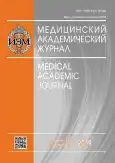IMPACT OF AGING ON THE DEVELOPMENT OF NEUROIMMUNE DEFICIENCIES AFTER EXPERIMENTAL MILD TRAUMATIC BRAIN INJURY (TBI)
- Authors: Serebryanaya NB1,2,3, Shanin SN1, Filatenkova TA1, Fomicheva EE1
-
Affiliations:
- Institute of Experimental Medicine, Saint Petersburg
- Saint Petersburg State University, Saint Petersburg
- North-Western State Medical University named after I.I. Mechnikov, Saint Petersburg
- Issue: Vol 19, No 1S (2019)
- Pages: 102-103
- Section: Articles
- Published: 15.12.2019
- URL: https://journals.eco-vector.com/MAJ/article/view/19347
- ID: 19347
Cite item
Abstract
Patient’s age affects the course of posttraumatic inflammation and recovery after TBI. The goal of the research was to identify the differences in neuroimmune deficiencies in young and old animals after experimental TBI. The research was carried out using male Wistar rats aged 3 and 18 months. Mild TBI was caused by weight drop TBI model. A group of animals was injected abdominally with 30 mkg/kg recombinant human interleukin-2 (Ronkoleukin, Biotech) daily for three days, starting 72 hours after TBI. The control group consisted of intact animals and rats who did not receive rIL-2 prior to TBI (n = 5 for both groups). The results obtained have shown that old animals after mild TBI had different testosterone and proliferative activity levels than the young ones; the injection of rIL-2 led to an increase in neurotrophic factors (testosterone and BDNF) without causing additional activation of lymphocytes.
Full Text
About the authors
N B Serebryanaya
Institute of Experimental Medicine, Saint Petersburg; Saint Petersburg State University, Saint Petersburg; North-Western State Medical University named after I.I. Mechnikov, Saint Petersburg
S N Shanin
Institute of Experimental Medicine, Saint Petersburg
T A Filatenkova
Institute of Experimental Medicine, Saint Petersburg
E E Fomicheva
Institute of Experimental Medicine, Saint Petersburg
References
- Cose S, Brammer C, Khanna KM, et al. Evidence that a significant number of naive T cells enter non-lymphoid organs as part of a normal migratory pathway. Eur J Immunol. 2006;36(6):1423-33.
- Richmond E, Rogol AD. Traumatic brain injury: endocrine consequences in children and adults. Endocrine. 2014;45(1):3-8. https://doi.org/10.1007/s12020-013-0049-1.
- Erickson KI, Prakash RS, Voss MW, et. al. Brain-derived neurotrophic factor is associated with age-related decline in hippocampal volume. J Neurosci. 2010;30(15):5368-75.
- Kalish H, Phillips TM. Analysis of neurotrophins in human serum by immunoaffinity capillary electrophoresis (ICE) following traumatic head injury. J Chromatogr B Analyt Technol Biomed Life Sci. 2010;878(2):194-200.
Supplementary files







